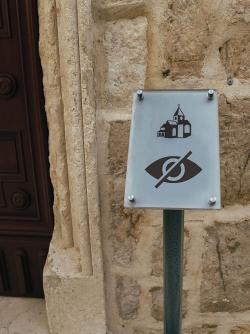The Coronation of King Charles III
Soon, the United Kingdom will formally crown King Charles III. Coronation is an ancient rite with biblical roots—but how many understand the true significance of the English throne?
When Queen Elizabeth II died at age 96 on September 8, 2022, her son and heir, Prince Charles, ascended to the throne. Two days later, after a lifetime’s apprenticeship for the role, Charles, already of pensionable age, was proclaimed King Charles III. Immediately, long-considered plans for the coronation, code-named Operation Golden Orb, swung into action. It will have taken some eight months—allowing adequate time for mourning and the completion of the planning process—to get everything ready for the big event.
On May 6, the coronation will take place in Westminster Abbey—kicking off a three-day holiday weekend of joyous celebrations, including concerts, special meals, and community events. The coronation affords a rare opportunity to take a closer look at this venerable and elaborate rite with all its majesty, pomp, and ancient ceremony. There is much to discover of its biblical connections, and how the coronation relates to our understanding of Britain’s antiquity and its role in the world today.
Anatomy of a Coronation
Let’s begin at the beginning. Just what is a coronation? And why is it important? At its heart it is a rite of passage—a pageant that portrays the ceremonial inauguration of a new monarch’s reign. But the British coronation stands alone in that it is a unique fusion of church and state in which the new king must take an oath before God and be anointed with oil.
Roy Strong, author of the epic and authoritative Coronation—From the 8th to the 21st Century, writes that the “central concept of setting a single human being apart by dint of anointing with holy oil as the embodiment of both crown and nation” is the greatest of all such rites of passage. It serves as “a foundation stone of the British State and a bulwark against its total secularisation” (p. xi).
Clearly, coronations have become an essential part of Britain’s national identity, dating back more than a thousand years to Anglo-Saxon rites in the tenth century AD. And lest we should think that the coronation service is rigid and set in stone, the very opposite is true. Strong’s research found that the coronation had “proved itself amazingly flexible over the centuries… revealing its ability to respond to and reflect every theological, political, social and cultural nuance” (pp. xi–xii).
But why perform a coronation ceremony of such scale, complexity, and expense, when something simpler might suffice? In the twenty-first century, is it really necessary for Britain to experience all this history, pomp, ceremony, and intertwining of church and state? And why anoint with oil? Where did that come from? Let’s look at the origins of unction—the practice of anointing kings with oil—first.
Biblical Precedents
“Unction was the application to a modern ruler of a ritual recorded in the Old Testament, the anointing of a chosen leader with holy oil” (Strong, p. 9). The origin of anointing kings in the Bible begins with the prophet Samuel, who anointed Saul as Israel’s first king: “Then Samuel took a flask of oil and poured it on his head, and kissed him and said: ‘Is it not because the Lord has anointed you commander over His inheritance?’” (1 Samuel 10:1). Verse 6 goes on to show the impact of this anointing—God’s Spirit was to come upon him, and he would prophesy and “be turned into another man.”
Later in the book, Samuel is told to anoint Saul’s successor, David, and the same ritual is enacted: “Then Samuel took the horn of oil and anointed him in the midst of his brothers; and the Spirit of the Lord came upon David from that day forward” (1 Samuel 16:13).
Later, Scripture records the anointing of David’s son Solomon as king:
“There let Zadok the priest and Nathan the prophet anoint him king over Israel; and blow the horn, and say, ‘Long live King Solomon!’ Then you shall come up after him, and he shall come and sit on my throne, and he shall be king in my place. For I have appointed him to be ruler over Israel and Judah.”… Then Zadok the priest took a horn of oil from the tabernacle and anointed Solomon. And they blew the horn, and all the people said, “Long live King Solomon!” (1 Kings 1:34–35, 39).
“In these biblical passages virtually all the elements which were to constitute the early Coronation ceremonies are already there: the selection of a king, his anointing with holy oil by a priest, his acclamation by the people and his enthronement” (Strong, p. 9).
This biblical rite of anointing kings with holy oil expanded widely during the seventh and eighth centuries AD, when barbarian kingdoms adopted many nominally Christian customs (p. 11). Examples of such “barbarian” peoples included the Angles and the Saxons who arrived in Britain after 400 AD and became known as Anglo-Saxons.
Anglo-Saxon Beginnings
Strong takes his readers back over a thousand years to these Anglo-Saxon times, which serve as an exemplar for the modern coronation. One of the early accounts of an English coronation describes that of King Edgar (959–975), who summoned to the city of Bath the leaders of the lands he ruled to participate in a ceremony wherein the bishops would bless, anoint, and consecrate him as monarch. The elaborate ceremony—conducted by Dunstan, the Archbishop of Canterbury—took place on the feast of Pentecost. Dunstan laid down conditions for the king to accept before he was anointed with oil.
So began the coronation oath, consisting of three pledges by the king to God (Strong, p. 4). Expressed simply, the king would do all in his power to maintain peace, administer justice, and exercise equity and mercy. This was then followed by the anointing of the king’s head with a special oil, performed by the bishops. This was the moment of “rebirth” and was accompanied by prayers invoking biblical examples (like those described earlier) and asking that the Holy Spirit would descend on and sanctify the king in the same way.
There then followed the most solemn moment of the coronation service, when an anthem was sung reflecting the biblical account of the coronation of King Solomon. This was then followed by an investiture with various regalia: a gold ring as “the seal of holy faith”; a sword symbolic of protecting the realm and defeating the enemies of the church; the “crown of glory and righteousness”; the sceptre, “‘the sign of kingly power, the rod of the kingdom, the rod of virtue’; and the staff or baculus of ‘virtue and equity.’” The service concluded with a Mass, and a grand feast then took place to celebrate the event.
What was the point of all this? Edgar was at the apogee of his reign, and this grand coronation was designed to declare his imperial status and publicise it throughout the country and across Europe. Shortly after, Edgar received the homage of his subject kings.
The oath had far-reaching implications because it meant that the king’s right to reign was not absolute, as in France, but conditional on the acceptance of responsibilities. This “set the English Coronation apart from any other and also [accounts] for its extraordinary longevity” (Strong, p. 4). To this day no other country has a coronation quite matching that of England—comprising an oath before God, an unction (anointing) seeking God’s blessing on the monarch’s reign, and such regalia as crown, orb, and sceptre.
These details of Edgar’s coronation are helpful because, down through the centuries, the service has remained essentially the same. No two coronations will be identical, because each is tailored to the precise needs of the time, but the overall outline remains unchanged. King Charles has indicated that his coronation “will be rooted in long-standing traditions” but will “reflect the monarch’s role today and look towards the future” (“King Charles: When is the coronation and what do we know about it?,” BBC.com, February 14, 2023).
The coronation is intended to be elaborate and detailed—with great pomp and ceremony, sumptuous clothing, beautiful music, peerless singing, polished readings, and heartfelt prayers. It will be meticulously planned, carefully orchestrated, diligently practiced, and much rehearsed. Nothing will be left to chance. The powerful sights, sounds, and emotional impact of the profound ceremony are designed for maximum impact on Charles, guests, and the general public. It will be conveyed by the broadcast media throughout the country, the Commonwealth, and the entire world, heralding the beginning of a new Carolean age for Britain. It is meant to be one of the most spectacular public events of a lifetime, attempting to bond everyone to the king and the values he promises to uphold.
A Coronation Outline
Building on the material we’ve related, we can expect the Charles III coronation to contain five main elements:
- The Recognition: Charles will be presented to the 2,000 or so guests assembled in the Abbey. The congregation will shout “God save the King” and trumpets will be blown.
- The Oath: Charles will then swear an oath to uphold the law and be loyal to the doctrines and practices of the Church of England, of which he is the Supreme Governor.
- The Anointing: A gold cloth canopy will be held over the Coronation Chair to conceal the king while the anointing takes place by the Anglican Archbishop. In the form of a cross, Charles will be anointed on his hands, chest, and head with special oil and consecrated to serve God and country.
- The Investiture: A newly robed King Charles, seated on the Coronation Chair, will be presented with important golden regalia including the Royal Orb and Cross, symbolizing the religious and moral authority of Christ; the Royal Sceptre, representing the king’s power and governance; and the Sceptre with a dove on top, representing that the Holy Spirit guides the king’s actions. The king is then crowned with “St Edward’s Crown.”
- Enthronement and Homage: The king will move to the actual throne, from which he will receive homage from peers. The Queen Consort will then be anointed and crowned in the same way.
The Coronation Chair of Westminster Abbey, which was built for King Edward I, is also an important part of this ceremony and has been in use since 1308. The Stone of Scone (see page 15), which sits under the chair, will be loaned by Scotland for the duration of the coronation.
Pray for the King
The coming coronation will be an event of the deepest meaning and significance for King Charles III and the nations he leads. It is a cornerstone of national identity and indelibly links Britain to its ancient Israelite roots and heritage. It serves as a harbinger of better times to come—so long as God and Scripture are honoured and fulfilled.
This is a crucial time in Charles’ life, when all his years of preparation will be put to the test. Will he prove to be a wise and understanding leader who sticks close to God and what God’s word says, whereby God will bless His reign and the nation accordingly, as the Scriptures promise? Or will the nation continue its downward path and abandonment of God’s standards, like so much of the world around it? The words of Scripture and Charles’ relationship with God are more vital now than ever before. It is no wonder that the Bible admonishes us to pray “for kings and all who are in authority, that we may lead a quiet and peaceable life in all godliness and reverence” (1 Timothy 2:2).






